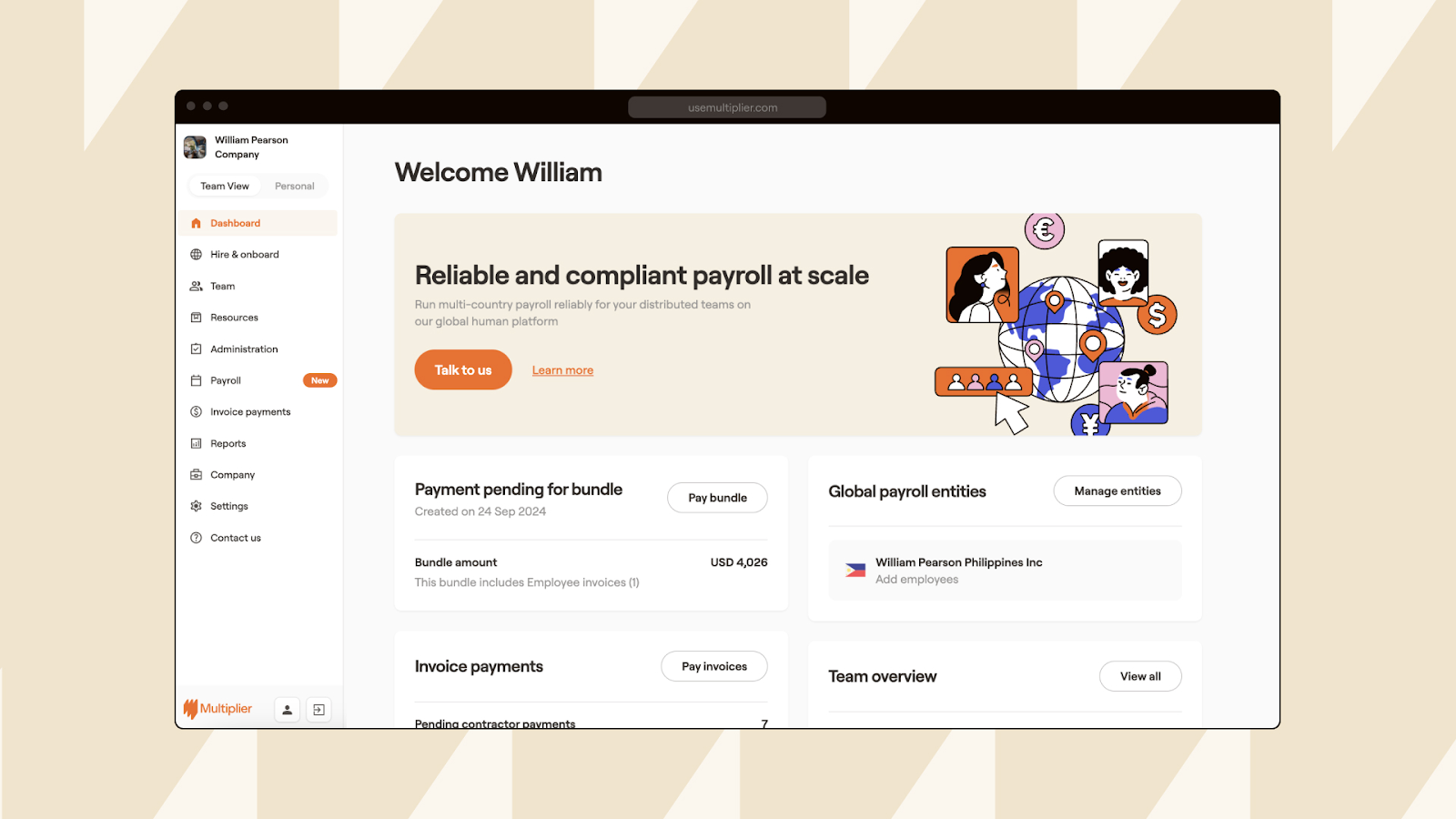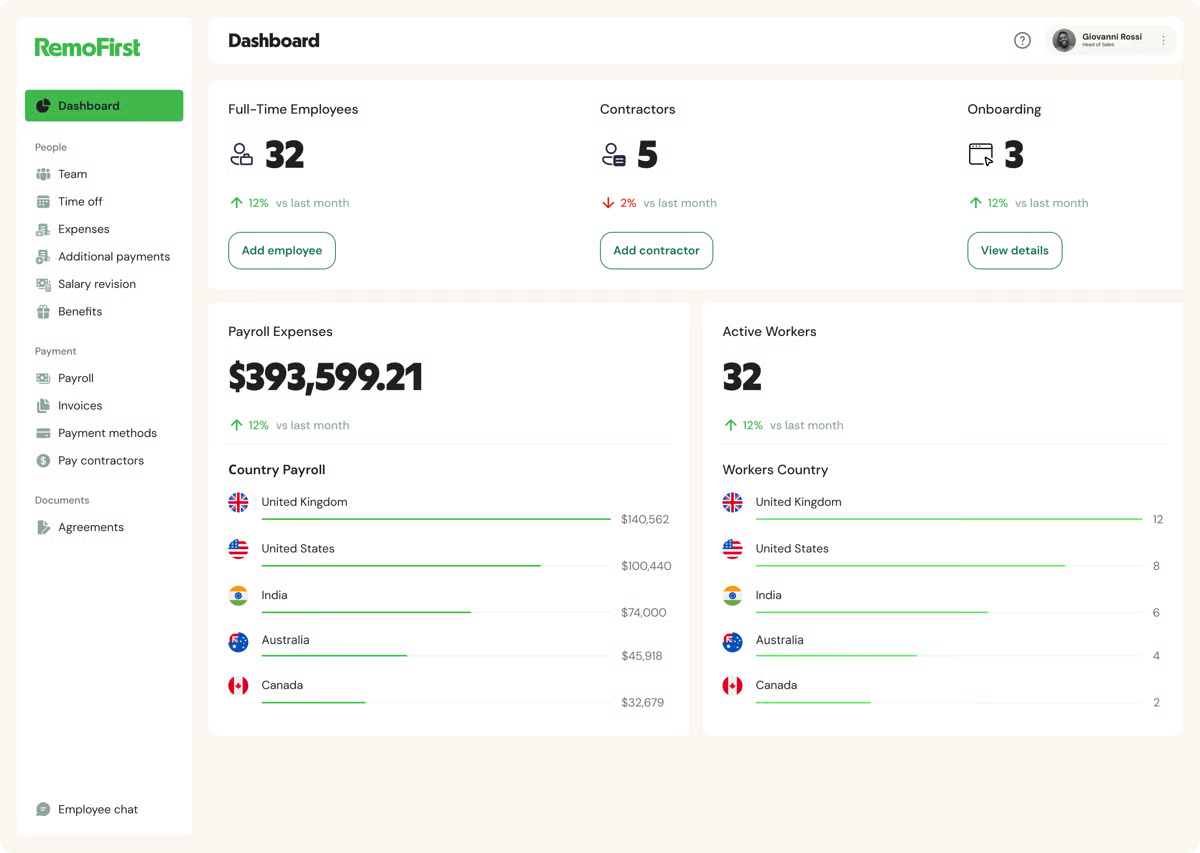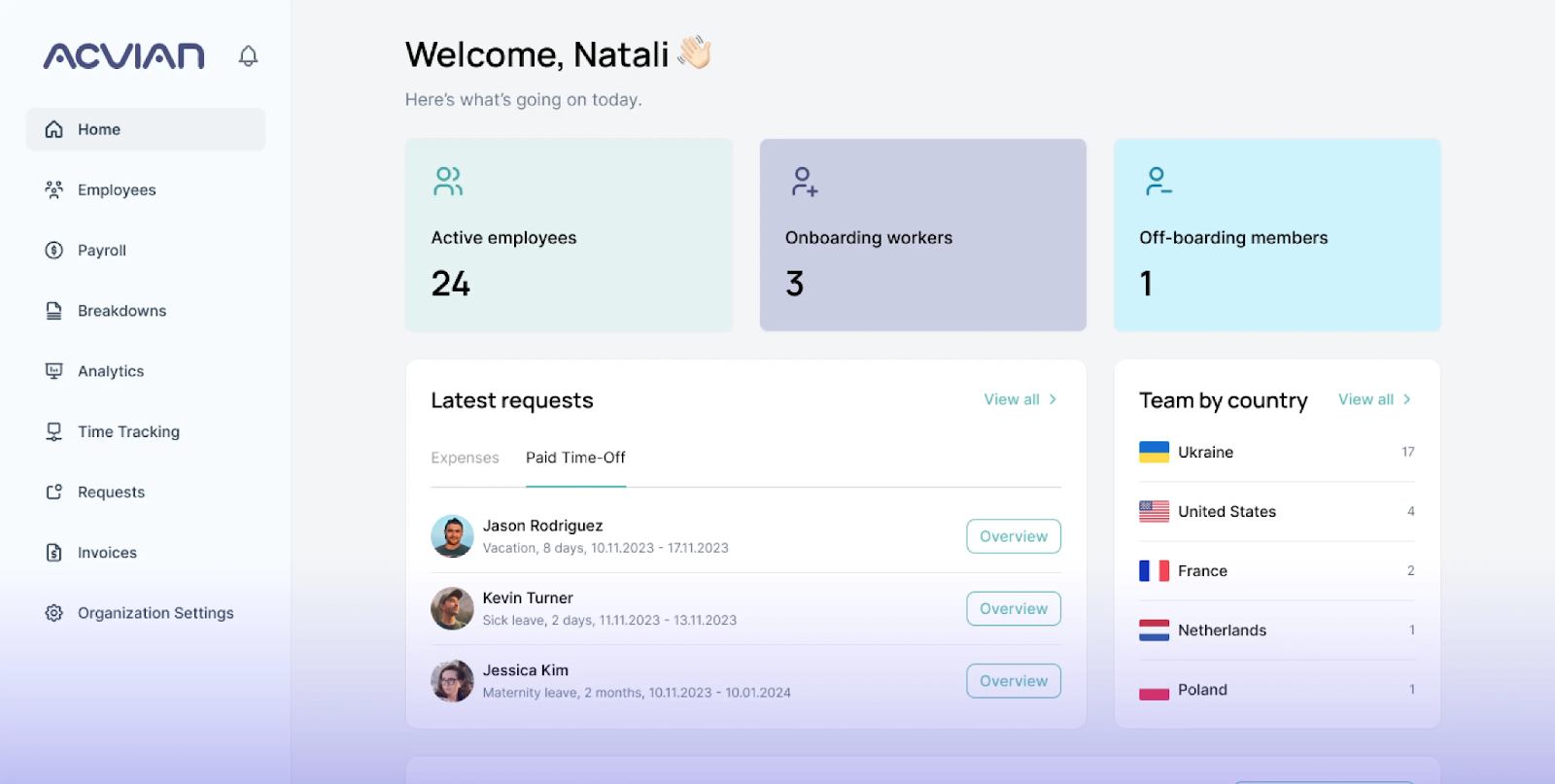Copied to Clipboard
Ready to get Started?


Key Takeaways
Startups need rapid onboarding, transparent per-employee pricing under $600, and legal protection in multiple markets to stay competitive.
Coverage and support matter as much as price. The best EOR depends on your growth stage and expansion strategy.
The best EORs not only support today’s small teams but also make it easy to scale into new markets or transition off their services once a startup establishes its own legal entities.
Expanding a startup is supposed to feel like growth mode – new markets, new hires, new opportunities. But when I talk to global hiring teams, what I hear most isn’t excitement about global talent; it’s frustration. The reality is that scaling across borders means endless contracts, compliance checks, payroll headaches, and trying to stay on top of labor laws in countries you may never have even set foot in. For most startups, that’s a roadblock that stalls growth.
That’s where an Employer of Record (EOR) comes in. Instead of spending months (and thousands of dollars) setting up a legal entity in each country, an EOR acts as the legal employer for your international team. They make sure that you don’t get stuck in the weeds of HR admin so that you can stay focused on building products and your customer base.
Now, full disclosure: I’ve never run a startup myself. But I’ve gone deep into the research – listening to founders on podcasts, reading case studies, and digging through reviews from the people who’ve actually used these services.
That’s why I put this guide together. I’m sharing what I’ve learned from founders, customers, and my own deep dives into the most popular platforms. Here’s my curated list of the best EOR for startups in 2026 and the tools I’d trust if I were making the leap into global hiring today.
TL;DR: Best EOR for Startups
If you’re tight on time, here’s an overview of what I’ll cover in the rest of the article.
What Matters Most For Startups When Choosing an EOR?
Setting up a legal entity in a single country (never mind in several), takes months and costs a fortune – time and money most startup founders can’t spare. Add legal compliance risks, payroll set up, and the pressure to offer competitive benefits, and growth can grind to a halt.
That’s why many startups consider partnering with an EOR. It removes those barriers so teams can stay focused on building. From founder stories, G2 reviews, and endless research, I’ve found a few themes that consistently make or break an EOR decision for startups.
Here are a couple of the advantages of partnering with an EOR:
- Geographic Coverage & Depth: Startups dream big. Even if you’re only hiring in one country today, you’ll probably need to expand further tomorrow. Wide coverage matters, but so does local expertise (owned entities, strong partnerships). Without it, you risk payroll delays and compliance risk.
- True EOR (vs. payroll-only or contractor routing): Some services just process payments. A true EOR handles contracts, benefits, and compliance for employees, not just payroll. This reduces the risk of worker misclassification and gives your team stability.
- Transparent, Startup-Friendly Pricing: Startups operate on thin margins that often can’t swallow unexpected costs. Look for clear EOR pricing (usually per employee per month), ideally under $600 per employee, per month. The industry average sits between $400 and $600. Bonus points for no hidden fees on onboarding or currency conversions.
- Speed & Ease of Onboarding / Switching: Startups move fast. Waiting weeks to get someone onboarded can kill momentum. The best EORs offer quick onboarding and make it painless to switch from another provider.
- Integrations & Tools: You don’t want to juggle five different dashboards. EORs that integrate with your existing HR stack help a user-friendly employee experience from day one.
- Support & Risk Mitigation: This one’s often underrated. You likely don’t have big in-house HR teams (or don’t want one), so you need quick, human support and legal experts in unfamiliar markets, who can step in when something goes wrong.
- Scalability & Exit Flexibility: Today you’re hiring 5 people; tomorrow, it’s 50. And eventually, you might set up your own legal entities. A good EOR scales with you and makes it easy to part ways when the time comes.
7 Best EOR Providers for Startups & How They Stack Up
Here’s where the rubber meets the road. Based on my research and the feedback from the lived experiences of both employers and employees, these are the 7 platforms worth their salt if you’re a startup looking for an EOR.
1. Playroll: Best For Speed, Startup Support, and Dedicated Employee Care
What I like most is how startup-friendly it feels – it doesn’t overwhelm you with too many features you don’t need, and the support team genuinely cares about creating a good experience for both startups and the people they employ. If there’s one EOR I keep coming back to, it’s Playroll. Yes, I might be a bit biased because I work for them, but all of my points can be backed up by real customer feedback.

Pros
Playroll is active in 180+ countries, owns the majority of their own entities, and I’ve seen startups rave about how quickly they can onboard (sometimes same day). On G2, users praise its intuitive design, quick response time of the support team, and a high level of professionalism when it comes to keeping your company data secure.
“Playroll makes it incredibly easy to hire and manage remote employees around the world. The onboarding process is smooth, the platform is intuitive, and the support team is always responsive and helpful. I especially appreciate the transparency around compliance and local labor laws – it gives us peace of mind when expanding into new markets. Payroll feels less like a vendor and more like a partner.”
- Verified G2 User
Cons
On the other hand, Playroll has gotten some criticism on less flexibility to customize contracts and its mobile experience; cons that are also common with other EORs on this list.
Key Features of Playroll
- Global Employment Infrastructure: What I like most about Playroll is how it makes global hiring feel manageable instead of overwhelming. They generate compliant contracts, register employees with the right authorities, and protect your IP. For startups without a legal entity, that’s game-changing.
- Multi-Currency Payroll Automation: Payroll can easily become a time sink. Playroll handles taxes, deductions, and contributions automatically, syncing to local pay cycles. Their exchange rates are more competitive than what you’d expect.
- Localized Benefits Coordination: Benefits are one of the hardest things to get right globally. Playroll sets you up with country-specific perks (like healthcare, insurance, and retirement savings) so you can stay competitive when hiring. Plus, you can take advantage of group benefits rates.
- Compliance Automation: Laws change constantly. Playroll automates payroll, leave policies, and terminations, so you don’t have to spend hours trying to keep up with local regulations.
- People-First Support: Startups need more hands on support than SME and enterprise-level companies. Payroll provides support to both employers and employees at no extra cost over and above the $399 per month, per employee. HR, legal, and payroll support is built into the package while some other EORs charge a premium.
Pricing Plans
- From $399 per month, per employee. No annual commitment required for affordable prices.
2. Deel: Best Companies in Hyper-Growth

Deel is a popular name you’ll hear when it comes to EOR providers. They’re a big player in the global hiring space, which means they’re experienced when it comes to companies that are scaling quickly and juggling both contractors and full-time employees. It’s a particularly strong option for remote-first teams who need flexibility and global coverage without setting up multiple entities.
Pros
Deel covers 150+ countries, has a reputation for providing a “safe and professional” feeling for their clients, and makes payments incredibly simple with multi-currency support. On G2, users consistently mention its intuitive dashboard and how much admin time it saves.
“What I like most about Deel is how safe and professional everything feels. What I dislike about Deel is that sometimes the fees can feel a bit high, especially for smaller projects or short-term contracts.”
- Verified G2 User
Cons
The most common complaints are around the time it takes to process invoices, a lack of detailed reporting, and of course the high price tag. Reviewers also point to bloated features and an unintuitive, overcomplicated platform.
This on top of the fact that you won’t get the type of personal support that you’d get with a smaller EOR means Deel might not be the best partner for your startup.
Key Features of Deel
- Global Hiring Reach: Deel lets you hire in 150+ countries with contracts that meet local compliance requirements.
- Payroll and Payments: Multi-currency payments are fast and reliable, with most transactions processed the same day. Taxes and deductions are handled automatically.
- Contractor Classification Tools: Deel has built-in checks to flag misclassification risks so you can avoid costly mistakes.
- Integrations Hub: With 100+ integrations (QuickBooks, BambooHR, Slack), you can link Deel to the tools you already use, saving you double data entry.
- Compliance Experts: Their global team of 200+ local experts helps navigate terminations, benefits, and labor laws.
Pricing Plans
From $599 per month, per employee. Contractor plans are more affordable with flexible options.
3. Rippling: Best For Teams Wanting HR + IT in One Platform

With its custom apps and workflow builder, Rippling is great for tech-heavy startups and naturally then not great for teams that aren’t. Their platform lets you manage the whole employee lifecycle from onboarding an employee to setting up their laptop or app access in one unified flow. That makes it a strong fit for startups with distributed dev or product teams who want everything managed in one dashboard.
Pros
Rippling’s EOR package integrates with 500+ apps. Users rave about how quickly new hires can be onboarded, with IT and HR setup handled simultaneously. For scaling startups, this cuts down on admin overhead.
“What I appreciate most about Rippling is how intuitive and modern the user interface is. The only thing I dislike about Rippling is that the initial setup can feel a bit overwhelming due to the number of features available. ”
- Verified G2 User
Cons
Rippling is essentially 'jack of all trades, master of none. You can do a lot in one platform; but they're not a specialist EOR which your startup might need. Employees rely on a ticketing system, meaning when something goes wrong it isn’t handled on a personal level and is usually quite slowly. On top of that, their platform is incredibly complicated for beginners and users report needing a lot of training to gt ahang of it.
Key Features of Rippling
- Unified Workforce Management: Combines EOR services with IT provisioning for a single source of truth.
- Global Payroll Automation: Automates payments across 185+ countries with spend controls built in.
- App Integrations: Connects with 500+ apps including Okta, Slack, and QuickBooks.
- Equity & Benefits Support: Helps issue stock options and administer benefits compliantly.
- Automated Onboarding: New hires can self-onboard, cutting setup time significantly.
Pricing Plans
- Custom pricing (not publicly disclosed).
4. Multiplier: Cost-Effective Hiring in Emerging Markets

Multiplier is often the go-to for startups targeting Asia-Pacific or other emerging markets. I’ve noticed it tends to attract HR managers or finance teams who want to stretch every dollar while still hiring compliantly. The platform is built to be lean and practical: you won’t find a ton of enterprise bells and whistles, but you will get the essentials – compliant contracts, payroll, and immigration support – at a price point that feels far more startup-friendly.
Pros
What I like most about Multiplier is that it seems purpose-built for resource-conscious teams that don’t want to cut corners on compliance. It covers 150+ countries and is priced lower than the big-name providers which means it’s a solid option for established small businesses or startups with considerable cashflow. Plus, a lot of reviews suggest a great support team for when things do go wrong.
“Very easy to onboard and pay international employees without worrying about compliance. Some reports could use deeper customization and export options. Pricing is slightly on the higher side for startups scaling rapidly.”
- Verified G2 User
Cons
Although the sentiment about the functionality of the platform is generally positive, some users mention that it lacks the detail and customization they need when it comes to generating and exporting reports.
On top of that, its coverage is a bit limited in comparison to competitors, limited support functioning means tickets have slow processing times, and onboarding can take weeks instead of days.
Key Features of Rippling
- Coverage in Emerging Markets: Strong presence in APAC, India, and other high-growth regions.
- Cost-Effective Payroll: Automates payroll and tax compliance at lower price points than many competitors.
- Immigration Services: Supports visas and work permits across 150+ countries.
- Resource Library: Guides and compliance resources for teams new to global hiring.
- 24/7 Support: Around-the-clock access to their compliance and legal team.
Pricing Plans
From $400 per month, per employee.
5. RemoFirst: Best For Affordability Without Losing Global Reach

RemoFirst has quickly become one of the scrappy challengers in the EOR space, and it’s easy to see why. It’s one of the most affordable providers on the market, covering 180+ countries while keeping things simple and transparent.
I’ve noticed it appeals most to early-stage founders who want to get compliant fast without committing to an enterprise-style platform. RemoFirst doesn’t overload you with features you may never use.
Pros
What makes RemoFirst stand out is its pricing, which starts as low as $199 per employee per month. That’s a fraction of what the big players charge, and for many startups it means the difference between hiring globally now or waiting until the next funding round. It’s leaner, yes, but for cost-conscious founders, it’s a way to access global talent without breaking the bank.
“Hiring and managing international talent can be complex, but RemoFirst provides a streamlined solution that helps companies stay compliant while making onboarding and payroll seamless for remote employees. At times, the analytics can feel a bit limited in terms of detailed analytics and customization.”
- Verified G2 User
Cons
Because it’s leaner, you won’t find the same level of deep integrations or advanced analytics that platforms like payroll, Deel, or Rippling for example provide. RemoFirst doesn’t own any of their own entities which means they’re entirely reliant on third-party partners.
This comes with a lot of risks for data security and can result in delayed communications and consequently delayed processes including payroll runs.
Key Features of RemoFirst
- Global Employment Coverage: Hire in 180+ countries with compliant contracts and payroll.
- Pricing: Transparent per-employee pricing with no hidden fees.
- Multi-Currency Payroll: Automates deductions and tax filings across local cycles.
- Contractor Management: Affordable per-contractor plans, including invoicing and payments.
- Lean Platform: Focuses on simplicity and speed rather than endless feature bloat.
Pricing Plans
From $199 per employee, per month.
6. Acvian: Best For Startups Hiring in the U.S. and Eastern Europe

Acvian isn’t the biggest name in the industry, but sometimes that’s exactly what a startup needs. With a strong focus on the U.S. and Eastern European markets, Acvian is ideal if you’re building an engineering hub in places like Poland or Romania, or growing your go-to-market team in the States. What I like is that they combine regional expertise with a personal, hands-on approach that bigger providers often can’t deliver.
Pros
From what I’ve gathered, Acvian resonates with founders who want direct access to a support team. They’re flexible, responsive, and cost-competitive – qualities that matter a lot when you don’t have an in-house HR department to handle surprises. While their coverage isn’t as broad as Deel or Playroll, their depth in specific regions makes them a smart, focused choice for the right startup.
“The team knows labor legislation and can expertly advise on employer taxes and employment regulations in Ukraine and other countries. They should extend their services to other countries too.”
- Verified G2 User
Cons
Acvian’s limited global footprint could be a blocker if you’re planning a multi-continent expansion. You’ll also find fewer automation features compared to larger platforms, so some processes may feel more manual. On top of that, their EOR offering is quite lean in comparison to other providers. You have to upgrade to the more expensive package if you want the elements that generally come with a typical EOR’s offering.
Key Features of Acvian
- Regional Focus: Strong compliance coverage in the U.S. and Eastern Europe.
- Flexible Contracts: Quick setup and customizable agreements tailored to startup needs.
- Payroll Processing: Handles taxes, benefits, and contributions with local expertise.
- Hands-On Support: Smaller team but more direct, human-first guidance.
- Affordable Options: Pricing often comes in lower than big-name competitors.
Pricing Plans
From $499-$699 per employee, per month depending on the level of support you need.
7. Teamed: Best For UK and Europe-Focused Startups

Teamed is a boutique EOR that’s laser-focused on the UK and Europe, but they do service some additional countries outside of these geographies. It’s not trying to be everything to everyone and that’s a good thing for a startup looking for regional expertise. If you’re hiring across the EU, Teamed helps you handle payroll, compliance, and benefits in markets where labor laws can get messy fast.
I’ve noticed it’s especially appealing for startups that want to expand into Europe but don’t have the bandwidth to figure out each country’s rules themselves.
Pros
What stands out about Teamed is its attention to the employee experience. Beyond just generating compliant contracts, they help you offer localized benefits – pensions, healthcare, and perks that actually matter to candidates in each market.
“ Teamed solved the complex problem of relocating me to Japan and handling all the related processes. The EOR monthly fee can be a bit high for small companies.”
- Verified G2 User
Cons
Teamed’s regional specialization means it’s not suitable if you need APAC, LATAM, or global coverage beyond Europe. It also offers fewer high-tech features like integrations or automation, which may matter if you’re scaling at pace.
Key Features of teamed
- European Coverage: Strong focus on UK and EU countries.
- Localized Benefits: Health insurance, pensions, and other perks tailored to European markets.
- Payroll & Compliance: Automated payroll with full adherence to EU labor laws.
- Boutique Support: More personal service, with faster response times for smaller clients.
- Founder-Friendly Pricing: Competitive rates aimed at small and scaling companies.
Pricing Plans
From $540 per employee per month
When Should A Startup Consider Using an EOR Service?
Startups usually don’t start out thinking, “We need an EOR.” They hit a wall first when expanding across borders, whether it’s because of compliance issues, payroll stress, or the cost that comes with setting up legal entities. Here are the moments when you should consider partnering with an EOR:
- When You Want to Expand Globally Without Setting Up a Legal Entity: Incorporating a company in every country is expensive, slow, and frankly, a distraction. An EOR lets you hire talent abroad in days without the paperwork and cost nightmare of establishing multiple legal entities.
- When You Want To Reduce Administrative Tasks (Payroll, Taxes, Benefits): Startups are already juggling product, funding, and growth. An EOR takes repetitive admin – like running payroll, filing taxes, and setting up benefits – off your plate so your small team can stay focused on building.
- When Compliance Risk is Too High to Manage Alone: Labor laws change constantly, and the penalties for getting them wrong aren’t pretty. An EOR acts as the legal employer, keeping your company compliant across countries you’d otherwise need an army of lawyers to manage.
- When You Need Employees Onboarded Yesterday: In the startup space, timing is everything. With an EOR, you can hire and onboard employees in days (sometimes hours), compared to between 6 and 12 months of entity setup. That speed can mean beating a competitor to market.
- When You Need Flexible Scaling Without Long-Term Commitments: Some hires are strategic experiments – you don’t know if you’ll stay in that market forever. An EOR gives you the flexibility to scale up or down without committing to long-term infrastructure that would take between 12 and 24 months to dismantle. This means you can test whether your product is going to work without committing 100%.
- When You Want to Offer Employee Benefits to Attract Top Talent Globally: Great talent expects competitive benefits, no matter where they live. When you’re a startup, you might not have the budget to accommodate these expectations. With an EOR, you can take advantage of group rates and expertise in localized health insurance and pensions. They’ll help you create an offer that feels strong in-market and not like a “remote afterthought.”

How Do You Transition to an EOR as a Startup?
One of the most common stressors for startups considering using an EOR (and for most other changes in life) is the transition process. It’s easy to see how global teams tie themselves in knots over this, but honestly, moving to an EOR is much more straightforward than most expect.
The process usually boils down to four steps:
- First, define what you actually need. Which countries are you realistically expanding into in the next 6–12 months? How many people do you plan to hire, and in what roles? Are they contractors you want to convert, or brand-new employees? Getting specific here will save you time when comparing providers.
- Then, shortlist a few providers, sit through demos, and push them on details like pricing transparency and local coverage.
- Once you’ve found the right fit, you sign an agreement that clearly outlines who’s responsible for payroll, benefits, and compliance.
From there, the heavy lifting shifts off your plate. You hand over employee data, and the EOR handles the onboarding process – compliance paperwork, contracts, payroll setup, and local registrations.
Choose Playroll as an EOR to Move Fast While Scaling
After digging into dozens of EORs, Playroll is the one I’d bet on if I were building a startup today. It combines transparent pricing, speed, and hands-on support that most competitors only offer to their enterprise clients.
For a lean team, this is a winning combination. You don’t need another faceless vendor, you need a partner that helps you move fast without tripping over compliance. Playroll does exactly that, making global hiring feel less like a legal gamble and more like a growth strategy.
If you’re interested in seeing what our platform is all about, book a demo with our team today.

EORs for Startups FAQs
Which EOR provider is the best for startups?

.png)
Playroll is widely considered the best choice for startups thanks to its transparent pricing ($399/month), rapid onboarding, and dedicated support designed for lean teams. For founders making a decision purely on cost, RemoFirst is the most budget-friendly option.
Which EOR is most affordable for startups?

.png)
RemoFirst, starting at $199/month per employee, is the most affordable EOR for startups. However, it comes with trade-offs. Its platform is leaner, with fewer analytics features and more limited global coverage.
What is the difference between EORs for startups and large companies?

.png)
Startups typically prioritize speed, predictable costs, and easy integrations that let them scale without extra complexity. Larger companies, by contrast, look for enterprise-grade solutions: advanced analytics, customized workflows, and compliance frameworks that can support thousands of employees across multiple regions.
How long does it take to start hiring with an EOR?

.png)
Most leading EORs, such as Playroll and Deel, can onboard employees in just a few days. Achieving full compliance usually takes 1–2 weeks which is still far faster than the months required to establish a local legal entity.
.svg)
.svg)
.svg)

.svg)
.svg)





.png)

.svg)


.png)











.svg)